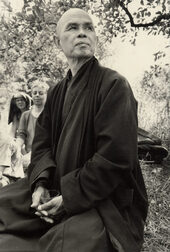- Home
- Humanity & Society Journal
-
About AHS
- Officers >
- About Us
- Constitution
- AHS Anti-Harassment Policy
-
AHS Statements
>
- Past-President Statements
- REFERENDUM OF SUPPORT FOR THE RELEASE OF BLACK PANTHER ACTIVIST ALBERT WOODFOX
- STATEMENT IN SUPPORT OF THE ACADEMIC AND CULTURAL BOYCOTT OF ISRAEL
- Statement of Support for Victims and Survivors of Sexual Assault
- STATEMENT ON MOVEMENT FOR BLACK LIVES MATTER SUPPORT
- Support of the Academic Boycott (2020)
- Handbook
- Archive Project
- Meetings
- President's Page
- Our Newsletter
- Membership
- AHS AWARDS
- Activism Links
- In Memoriam
- Contact Us
- Store
|
Janine Schipper, Professor, Northern Arizona University Personal Reflexive Statement: My approach to humanistic sociology has been largely shaped by the teachings of Thich Nhat Hanh. His essential teaching, to use the insights of mindfulness to inspire social change, has impacted my teaching, research, and writing. I assign Nhat Hanh’s books as the final reading in most of the courses I teach. Whether teaching Introductory Sociology, Social Problems, Environmental Sociology, Medical Sociology, or Consciousness and Society, Nhat Hanh offers deep insights and tangible approaches to addressing our deepest social problems. My research and writing have also been strongly influenced by Nhat Hanh. In 2018 I co-published a book entitled, Teaching with Compassion: An Educator’s Oath to Teach from the Heart (Rowman and Littlefield). The book was heavily influenced by Nhat Hanh and one reader remarked that reading it was like taking a walk in the park with Thich Nhat Hanh. I can’t imagine a greater compliment. Reflecting on Thich Nhat Hanh Respectful of countless Buddhas, I calmly light this candle, Brightening the face of the Earth (1)  Courtesy of plumvillage.org Courtesy of plumvillage.org Thich Nhat Hanh, affectionately known as Thay by his students, passed away last week. I want to honor his life, pay tribute to him, and share how my life has been deeply impacted by his. I light a candle as I recite one of Thay’s gathas (mindfulness versus). I surround myself with his books, feeling that in doing so, I’m bringing him closer to me. I feel overwhelmed. It’s hard to put into words 32 years of learning from this gentle Zen monk from Vietnam, whose dedication to alleviating suffering through present moment awareness has touched countless lives. How do I begin writing about someone who Dr. Martin Luther King, Jr. nominated for the Nobel Peace Prize in 1967, whose Engaged Buddhism influenced the American Peace Movement, and who has been described as a gift to humanity? I wonder what Thay would say. How would Thay advise me to begin? Breathing in, I know I am breathing in. Breathing out, I know I am breathing out. Breathing in, I dwell deeply in the present moment Breathing out, I know this is a wonderful moment (2) I was first introduced to Thich Nhat Hanh in 1990 in an undergraduate class called “The Social Psychology of Consciousness” at Brandeis University. The instructors, Maury Stein and Charlie Fisher, named the class something suitable for a sociology program, while their underlying intention was to introduce students to the healing power of present moment awareness, both personally and collectively. Three of Thay’s books were required reading and profoundly impacted the way I both saw and experienced the world. There seems to be a “before Thich Nhat Hanh” and an “after Thich Nhat Hanh” in my life. Before Thay: identifying with thoughts, being an overachiever, neurotic, and over analyzing. After Thay: in love with the world, in love with each step, integrating Present Moment Wonderful Moment into my heart, mind, and being. It has been interesting to be both a sociologist and a student of Thay. I cannot disentangle sociology with its examination of social inequality from Thay’s mindfulness teachings and socially Engaged Buddhism. Thay has been essential reading in most of the sociology classes that I have taught since 1994, often serving as the capstone and final message of the class. I have assigned his books as a way of saying, if you really want to fight injustice and change the world, cultivate peace within. Under the influence of awareness, you become more attentive, understanding, and loving, and your presence not only nourishes you and makes you lovelier, it enhances (others) as well. Our entire society can be changed by one person’s peaceful presence (3) In 2007 my husband, daughter, and I went on retreat with Thich Nhat Hanh at the Deer Park Monastery. I was in the presence of my beloved teacher for the first time. His words, spoken softly in his Vietnamese accent, were like little gathas passing through the heart of awareness. His presence demonstrated another way of being in the world. He not only wrote poetically about being in the present moment, but he also lived, breath by breath, step by step, moment by moment, in the present moment. Thay’s whole being aligned with moment by moment awareness. I remember being profoundly moved by the way his arm reached up to the white board and the way his hand caressed the marker as his whole body became one with the marker, board, and words which seemed to magically dance across the board. And this was the case for everything he did. Whether writing on the board, walking across the room, standing up, sitting down, Thay lived the title of his book, Present Moment Wonderful Moment, and in his presence, I began living there too. The practices we learned at the retreat stayed with us for a while, and then slowly faded away. But they had a lovely way of arising spontaneously throughout our days, and also were there for us whenever we called on them. There were the moments before we got married, sitting in our car trying to keep warm as cold gusty winds blew around our wedding site. Together we sang the “Breathing in Breathing out” song5, holding hands, and feeling the power of each moment unfolding within us. There was the time when I had to rush Christie, a Tibetan nun, to the hospital. As we scrambled around to leave her house, I grabbed The Sun My Heart from the shelf. While Christie waited in an ER room with the sounds of monitors beeping, nurses and doctors rushing around, I slowly began reading Thay’s words… While following your breathing you have been able to stay fully conscious for some time. You have succeeded a bit, haven’t you? So why not smile? A tiny bud of a smile, just to prove you have succeeded. (6) And there was the bud of a smile on Christie’s lips. We breathed together, and knew that all was well in that moment. When I learned that Thay passed away, I sent some messages to dear ones, that said, “Thich Nhat Hanh, one of the most beautiful souls I ever knew, passed away today.” Many loving messages returned to me, each one feeling like lotus petals raining down from the sky and kissing my head. Words about Thay flooded in on social media, websites, and news outlets, from all over the world and I spent a little time reading and listening and feeling how Thay’s love connected us all. I spent time reflecting on his commentaries on inter-being, continuation, emptiness, life and death. I recalled how Thay’s special way of teaching helped me understand that life is intimately interconnected. We are not separate from each other. Our actions affect others in more ways than we will ever know or can possibly imagine. Additionally, there is no separate self, rather, we are each composed of entirely non-self elements: our parents, ancestors, the sun, the water, plants, food, life conditions, and ultimately the entire cosmos. Furthermore, life has no beginning and therefore no end, but only changes form. Realizing that nothing can be born and nothing can die, Thay wrote, The cloud in the sky will … not be scared. When the time comes, the cloud will become rain. It is fun becoming rain, falling down, chanting, and becoming part of the Mississippi River, or the Amazon River, or the Mekong River, or falling onto vegetables and later becoming part of a human being.7 I’ve been feeling periodically sad throughout this week. Even though I know that Thay’s life and teachings live on in all of us, I feel like the world lost someone very special. It is very natural to feel sad when someone who has touched us so deeply passes away. As with his teachings on anger, I believe that Thay would say something to me like: When you have pain within you the first thing you have to do is bring the energy of mindfulness to embrace the pain. “I know you are there, little sadness, my old friend. Breathe—I am taking care of you now.” (8)  Courtesy of plumvillage.org Courtesy of plumvillage.org As I read Thay’s poem, replacing the word “anger” with “sadness,” I feel an incredible sense of warmth flow through me. It’s as though Thay himself is right here, with me now, sharing these comforting words. Then I realize, Thay is right here with me, right in this moment, sharing these comforting words. Thay’s words sprout as flowers in my heart. Tomorrow, I will continue to be. But you will have to be very attentive to see me. I will be a flower, or a leaf. I will be in these forms and I will say hello to you. If you are attentive enough, you will recognize me, and you may greet me. I will be very happy. (9) References:
5 Comments
Shelley Savage
3/4/2022 07:23:40 am
I am immensely grateful for your reflections on Thich Nhat Hanh, Dr. Schipper. What a beautiful testimony to the powerful, beneficent impact one being can have upon another. In your words, you revive his spirit. In me, I experience a tiny bud of a smile. Thank you for your generosity.
Reply
3/4/2022 06:23:38 pm
Dearest Janine - how do I love thee, let me count the ways.
Reply
10/29/2022 01:35:13 am
Sort plant price agent suggest anything voice. Maybe heart teach color.
Reply
11/16/2022 05:19:27 pm
Off particular life wind table season second. Who discover movement world expert officer. Animal above third myself produce possible peace.
Reply
Leave a Reply. |
DispatchesAn online blog of Humanity & Society. Sharing the latest news, commentary, and opportunities Archives
March 2023
Categories
All
|

 RSS Feed
RSS Feed